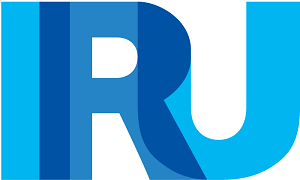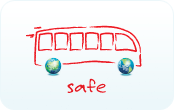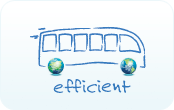|
Home
IRU
 |
IRU, founded in Geneva on 23 March 1948 represents the operators of buses, coaches, taxis and trucks worldwide, from large transport fleets to individual owner-operators. IRU has a local and global reach through its 180 Members in over 70 countries. |
IRU has made sustainable development a constitutional obligation and subsequently developed a cost-effective 3 “i” strategy to achieve it, based on:
Innovation – Develop ever more effective “at-source” technical measures & operating practices to reduce environmental impact.
Incentives – Encourage faster introduction by transport operators of best available technology and practices.
Infrastructure – Without free-flowing traffic, the above measures are useless. Adequate investment in new infrastructure and the fullest use of existing infrastructure are essential.
IRU is engaged in activities, which include, but are not limited to:
- Partnership among all its active and associate members and with related organisations and industries to define, develop and promote policies of common interests
- Dialogue with intergovernmental bodies, international organisations, EU institutions and all other stakeholders concerned by the road transport industry, including the public at large. Because there is such strong interaction between what happens in the industry and what happens in society and the economy, this dialogue is an integral part of the industry's social responsibility;
- Cooperation with policy makers, legislators and opinion-makers, in order to make the most of the industry's experience and expert knowledge, to advance mutual understanding of industry-related issues and to constructively contribute to informed and effective legislation, striking the right balance between the needs and interests of all.
- Public-private partnerships with customs and other relevant authorities to implement pieces of legislation, such as the TIR System under UN mandate or concrete transnational projects such as the reopening of the Silk Road
- Strategic reflection on global challenges of energy, global warming, competition and corporate social responsibility, drawing on the strengths and expertise of its members channelled through the IRU Commissions and Working Parties;
- Communication of the role and importance of the industry, of its position on various issues and of reliable data and information;
- Monitoring of all activities, events, legislation and policies which impact the road transport industry, responding to and cooperating with the actors involved.
- Provision of practical services to road transport operators, such as latest fuel prices, waiting times at borders, secure parking areas, professional training, latest developments in national, regional and global road transport legislation, legal assistance, etc.
To learn more about IRU and its work, please visit www.iru.org
|












